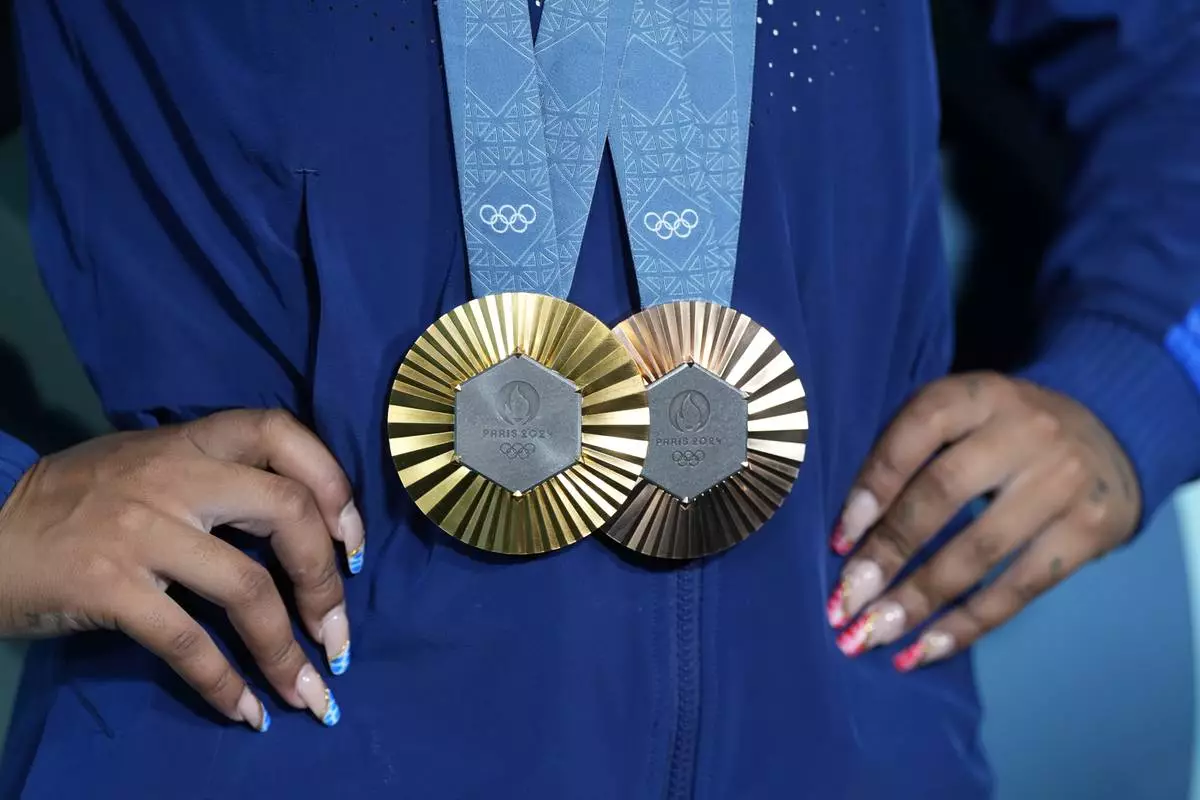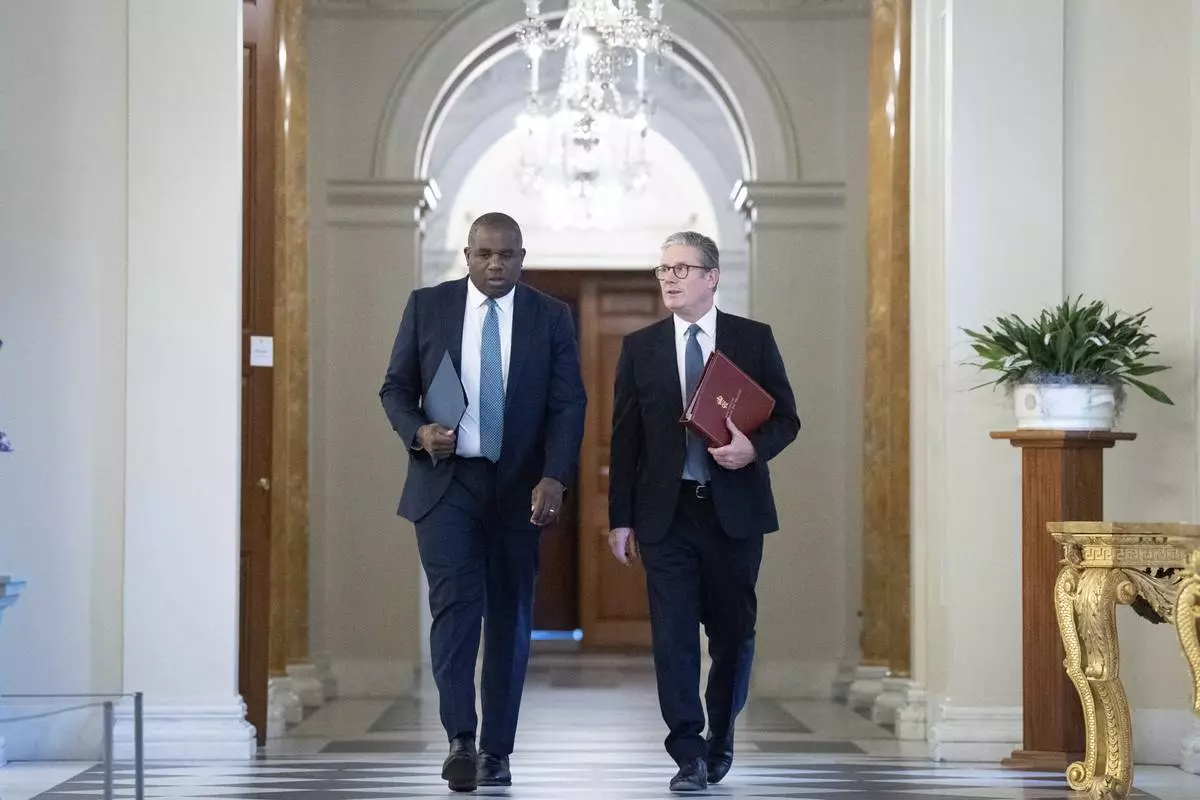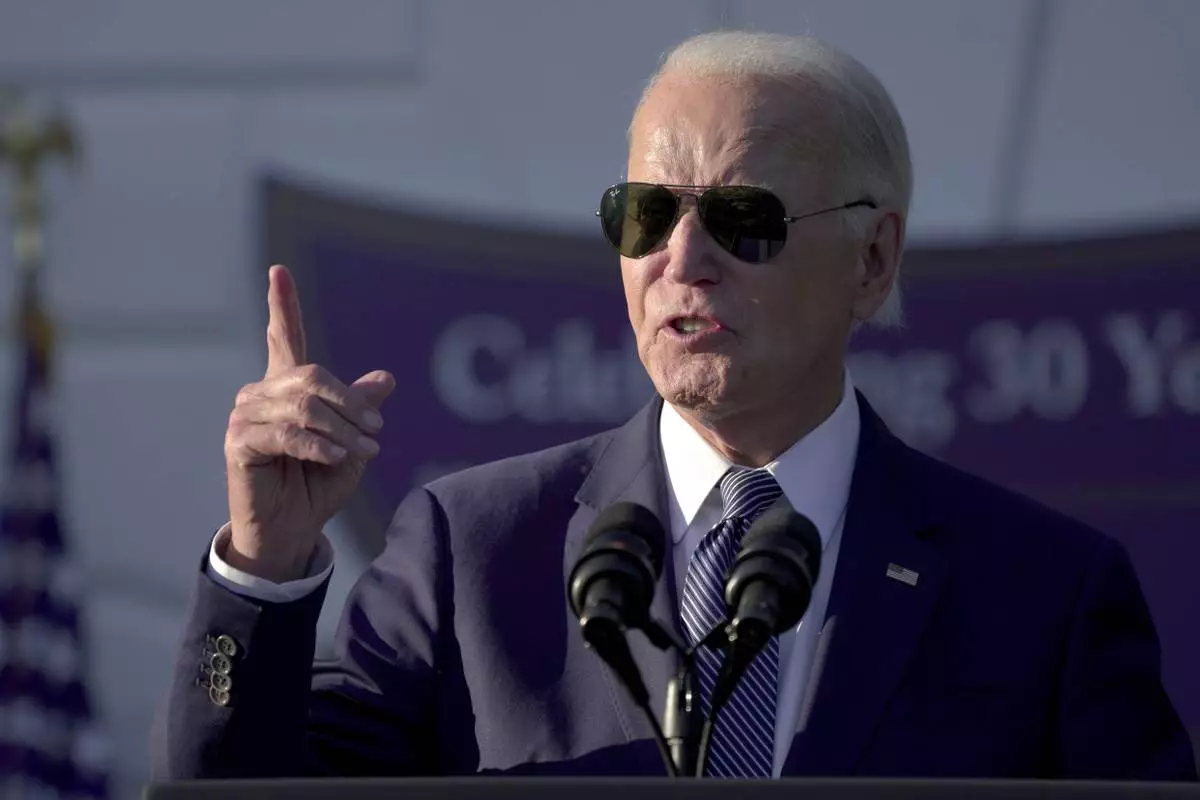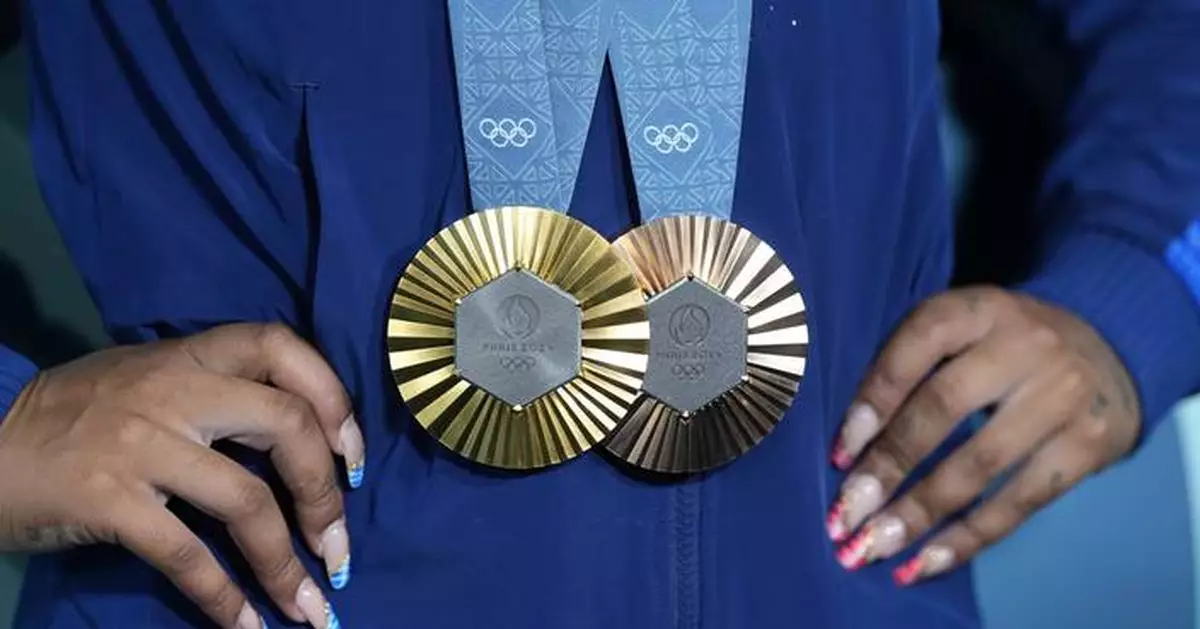PARIS (AP) — Romania’s Ana Barbosu replaced American Jordan Chiles as the Olympic bronze medalist in gymnastics floor exercise after the International Gymnastics Federation restored Barbosu to third.
The International Olympic Committee confirmed the reallocation of the medal less than 24 hours after the Court of Arbitration for Sport voided an appeal from Chiles’ coach during Monday's competition that vaulted her over Barbosu and onto the podium.
Here's a look at how Chiles, Barbosu and Romanian Sabrina Maneca-Voinea wound up in a scoring controversy that has been painful for all three.
Chiles qualified third in women's floor exercise and competed last in the eight-woman final, where the order was determined randomly in advance.
The 23-year-old finished her routine and was awarded a 13.666, which was fifth just behind Barbosu and Maneca-Voinea at 13.700.
Cecile Landi, who is Chiles' personal coach and also served as coach for Team USA in Paris, appealed to the judges to have an element restored to Chiles' routine. Judges approved the appeal, boosting Chiles' score by .1, good enough for Chiles to earn her third career Olympic medal to go with the team silver she won in Tokyo in 2021 and the team gold she helped the U.S. capture in Paris.
The Romanian Gymnastics Federation asked CAS to review the procedure surrounding Landi's appeal of Chiles' score.
International Gymnastics Federation (FIG) guidelines require coaches to make any appeal of a score within one minute of the score being posted.
CAS ruled that Landi officially made her appeal in 1 minute, 4 seconds, just past the deadline.
The appeal on Chiles was granted, with CAS ruling that Chiles' score should be dropped back down to 13.666 and that the initial order of finish should be restored.
Yes.
CAS wrote in its ruling that the FIG shall determine the final ranking, but added that FIG should assign the medal “in accordance with” the CAS decision. The FIG placed Barbosu third, Maneca-Voinea fourth and Chiles fifth.
The FIG said while the initial order was restored, it was up to the IOC to determine what would happen with the medals.
The IOC announced the bronze would indeed go to Barbosu and that it would work with the U.S. Olympic and Paralympic Committee to have the bronze awarded to Chiles returned.
The decision is in line with how the IOC typically views medal allocation.
At the Olympics, the governing body of each sport manages the competition and decides the results. The IOC typically accepts that result — once appeals to CAS are completed — and formally awards the medals.
The U.S. Olympic and Paralympic Committee says it plans to try, but it's unclear what the exact process would be. The two potential places the USOPC could take the appeal would be to Switzerland’s highest court, the Swiss Tribunal, or the European Court of Human Rights.
“The initial error occurred in the scoring by FIG, and the second error was during the CAS appeal process, where the USOPC was not given adequate time or notice to effectively challenge the decision,” said the USOPC statement, which was released Sunday.
While Barbosu was relatively quiet in the aftermath, Maneca-Voinea was not.
She used her social media accounts to highlight what she believed was incorrect scoring during her routine. The judging panel dinged her 0.1 point for stepping out of bounds while spinning around to start a tumbling pass.
Video evidence seemed to indicate that Maneca-Voinea's heel did not actually step on the boundary. The Romanian federation asked CAS to restore 0.1 to Maneca-Voinea’s score for a penalty that was given to her “without basis.”
The request was denied in part because Maneca-Voinea's coach did not appeal the score in real-time during the meet.
Chiles, who left Paris earlier this week to return home to the U.S., went dark on social media shortly before the CAS decision became public.
The two-time Olympian had been subject to attacks on her various social media platforms in recent days, with some critics suggesting she give the medal back.
Chiles posted on X not long after the final that “it's funny how some people can still never be happy for someone.”
Maneca-Voinea put together an aggressive campaign on social media, asking for justice.
Barbosu asked for calm earlier in the week, blaming the judging panel and not the gymnasts.
The Paris Olympics served as a comeback of sorts for one of the sport's former superpowers. The Romanian program medaled in the team final in 10 straight Olympics between 1976-2012 before falling on hard times over the last decade. When Barbosu and her teammates walked onto the floor for qualifying on July 28, it marked her country's first appearance under the rings in 12 years.
“We as athletes don’t deserve something like that, we only want to perform as best as we can and to be rewarded based on our performance," Barbosu said after returning to Romania. "The problems lie with the judges, with their calculations and decisions.”
American star and two-time Olympic champion Simone Biles encouraged Chiles — a longtime friend — to “keep her chin up.” U.S. standout and six-time Olympic medalist Sunisa Lee chimed in late Saturday, putting the onus on the judges and calling the outcome “unacceptable.”
AP Olympics: https://apnews.com/hub/2024-paris-olympic-games

Two-time U.S. Olympic gymnast medalist Jordan Chiles shows her medals after ringing the closing bell at the Nasdaq MarketSite, in New York's Times Square, Thursday, Aug. 8, 2024. (AP Photo/Richard Drew)

Ana Barbosu, of Romania, competes during the women's artistic gymnastics individual floor finals at Bercy Arena at the 2024 Summer Olympics, Monday, Aug. 5, 2024, in Paris, France. (AP Photo/Charlie Riedel)

Jordan Chiles, of the United States, holds up her medals after the women's artistic gymnastics individual apparatus finals Bercy Arena at the 2024 Summer Olympics, Monday, Aug. 5, 2024, in Paris, France. (AP Photo/Charlie Riedel)
WASHINGTON (AP) — Ukraine’s push to ease restrictions on the use of weapons from the United States and Britain will be discussed Friday in White House talks between President Joe Biden and Prime Minister Keir Starmer.
Ukraine and many of its supporters in the U.S. and Europe want Biden to let Kyiv use the weapons to strike military targets deeper inside Russia, and there are signs Biden might shift U.S. policy. Russian President Vladimir Putin has threatened that Ukraine’s use of long-range weapons would put NATO at war with Moscow.
Two U.S. officials familiar with discussions about the weapons said they believe Starmer will seek Biden’s approval to allow Ukraine to use British Storm Shadow missiles for expanded strikes in Russia. Biden's approval is needed because Storm Shadow components are made in the U.S. The officials, who spoke on condition of anonymity to share the status of private conversations, said they believed Biden would be amenable.
No announcement on a decision was expected Friday, several U.S. officials said.
During this week’s visit to Kyiv by Secretary of State Antony Blinken and British Foreign Secretary David Lammy, Ukrainian officials renewed their pleas to use Western-provided long-range missiles against targets deeper inside Russia.
Blinken said he had “no doubt” that Biden and Starmer would discuss the matter, noting the U.S. has adapted and “will adjust as necessary” as Russia’s battlefield strategy has changed.
Blinken spoke similarly in May, shortly before the U.S. allowed Ukraine to use American-provided weapons just inside Russian territory. The permitted distance has been largely limited to cross-border targets deemed a direct threat out of concern about further escalating the conflict.
Biden also has hinted that a change could be afoot. In an exchange with reporters this week about whether he was ready to ease weapons restrictions on Ukraine, he responded, “We’re working that out now.”
Putin said Thursday that allowing long-range strikes “would mean that NATO countries, the United States and European countries, are at war with Russia.” His remarks were in line with the narrative the Kremlin has promoted since early in the war, accusing NATO countries of de-facto participation in the conflict and threatening a response.
Starmer said Thursday on his way to the U.S. that Britain does not seek conflict with Russia.
“Ukraine has the right to self-defense, and we’ve obviously been absolutely fully supportive of Ukraine’s right to self-defense," he added.
On Friday, Russia accused six British diplomats of spying and said it would expel them. Starmer’s government called the accusation baseless and linked it to Britain’s expulsion of Moscow’s defense attache in London over spying allegations in May.
Ukrainian President Volodymyr Zelenskyy has pressed U.S. and allied military leaders to allow his forces to use Western weapons to target Russian air bases and launch sites far from the border as Russia has stepped up assaults on Ukraine’s electricity grid and utilities before winter.
“The war must become more difficult for Russia — that is the only way to make them realize it must end," he posted Friday on social media.
Zelenskyy's appeal has garnered support in U.S. and European security and diplomatic circles, including from some former U.S. generals and diplomats, lawmakers and security analysts. They argue that Russia's previous threats of escalation against the West have proven hollow and that the U.S. restrictions on weapons are making it impossible for Ukraine to gain the battlefield momentum it needs.
Even a few Ukrainian strikes with heavier weapons on military targets deeper into Russia would put more strain on Russian logistics, troops and other resources, said George Barros, a security analyst for the Institute for the Study of War.
Zelenskyy also wants more long-range weaponry from Washington, including the Army Tactical Missile System, known as ATACMS, for strikes in Russia.
Lt. Col. Charlie Dietz, a Pentagon spokesperson, said ATACMS would not be the answer to the threat Ukraine faces from long-range Russian glide bombs, which are being fired from more than 300 kilometers (185 miles) away, beyond the reach of ATACMS.
American officials also do not believe they have enough of the weapon systems available to provide Ukraine with the number to make a substantive difference on the ground.
Defense Secretary Lloyd Austin stressed Friday that decisions on what military support to provide Ukraine were complex, saying “there is no silver bullet when it comes to things like this.”
Starmer, meeting with Biden for the second time since his center-left government was elected in July, said he was visiting Washington for strategic meetings focusing on Ukraine and the Middle East. Britain last week diverged from the U.S. by suspending some arms exports to Israel because of the risk they could be used to break international law.
The White House talks were scheduled in part to help Biden and Starmer compare notes on the war in Ukraine, the languishing efforts to get a cease-fire deal in Gaza, mutual concerns in the Indo-Pacific and other issues before this month's annual meeting of global leaders at the U.N. General Assembly.
The White House also has tried in recent days to put a greater emphasis on the nexus between the war in Ukraine and the conflict in the Middle East that was sparked after Iranian-backed Hamas militants in Gaza attacked Israel on Oct. 7.
The Biden administration said this week that Iran recently delivered short-range ballistic weapons to Russia to use against Ukraine, a transfer that White House officials worry will allow Russia to use more of its arsenal for targets far beyond the Ukrainian front line while employing Iranian warheads for closer-range targets.
“This is obviously deeply concerning,” White House national security spokesperson John Kirby said. “And it certainly speaks to the manner in which this partnership threatens European security and how it illustrates Iran’s destabilizing influence now reaches well beyond the Middle East.”
Associated Press writers Jill Lawless in London, Dasha Litvinova in Tallinn, Estonia, and Ellen Knickmeyer and Tara Copp in Washington contributed.

Britain's Prime Minister Keir Starmer, right, and Foreign Secretary David Lammy at the British ambassador's residence in Washington, Friday Sept. 13, 2024, before their meeting with US President Joe Biden. (Stefan Rousseau/Pool via AP)

Britain's Prime Minister Keir Starmer, right, and Foreign Secretary David Lammy work on the plane as they fly to Washington DC, for talks with President Joe Biden on resolving the conflicts in Ukraine and Gaza, Thursday, Sept. 12, 2024. (Stefan Rousseau/Pool Photo via AP)

Britain's Prime Minister Keir Starmer, left, and Foreign Secretary David Lammy step from their aircraft as they arrive at Joint Base Andrews, Md., ahead of talks with U.S. President Joe Biden on resolving the conflicts in Ukraine and Gaza, Thursday, Sept. 12, 2024. (Stefan Rousseau/Pool Photo via AP)

President Joe Biden speaks during the Violence Against Women Act 30th anniversary celebration on the South Lawn of the White House, Thursday, Sept. 12, 2024, in Washington. (AP Photo/Manuel Balce Ceneta)

Britain's Prime Minister Keir Starmer, center, talks to the media on board his plane as he flies to Washington DC., Thursday Sept. 12, 2024. (Stefan Rousseau/Pool via AP)

















